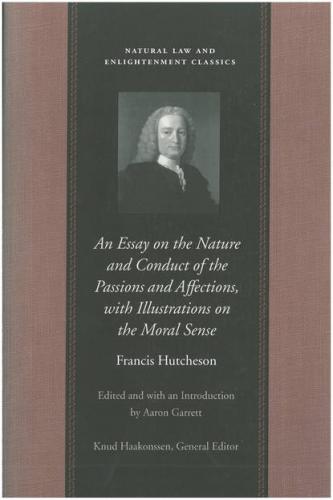[print edition page 12]
[print edition page 13]
THE CONTENTS
An ESSAY on the Nature and Conduct of the PASSIONS.
A General Account of our several Senses and Desires. Selfish or Publick.
Particular Divisions of the Affections and Passions,
A Comparison of the Pleasures and Pains of the several Senses, as to Intenseness and Duration,
[print edition page 14]
ILLUSTRATIONS upon the MORAL SENSE,
Concerning the Character of Virtue, agreeable to Truth or Reason,
Concerning that Character of Virtue and Vice; the Fitness or Unfitness of Actions,
Mr. Woolaston’s Significancy of Truth, as the Idea of Virtue, considered,
How far a Regard to the Deity is necessary to make an Action virtuous,
[print edition page 15]
An Essay on the Nature and Conduct of the Passions
A general Account of our several Senses and Desires, Selfish or Publick
[1/1] The Nature of human Actions cannot be sufficiently understood without considering the Affections and Passions; or those Modifications, or Actions of the Mind consequent upon the Apprehension of certain Objects or Events, in which the Mind generally conceives Good or Evil. [2] In this Inquiry we need little Reasoning, or Argument, since Certainty is only [2] attainable by distinct Attention to what we are conscious happens in our Minds.
Art. I. “Objects, Actions, or Events obtain the Name of Good, or Evil, according as they are the Causes, or Occasions, mediately, or immediately, of a grateful, or ungrateful Perception to some sensitive Nature.” To understand therefore the several Kinds of Good, or Evil, we must apprehend the several Senses natural to us.
There seems to be some Sense or other suited to every sort of Objects which occurs to us, by which we receive either Pleasure, or Pain from a great part of them, as well as some Image, or Apprehension of them: Nay, sometimes our only Idea is a Perception of Pleasure, or Pain. The Pleasures or Pains perceived, are sometimes simple, without any other previous Idea, or any Image, or other concomitant Ideas, save those of Extension,
[print edition page 16]
or of Duration; one of which accompanies every Perception, whether of Sense, or inward Consciousness. Other Pleasures arise only upon some previous Idea, or Assemblage, or Comparison of Ideas. These Pleasures, presupposing previous Ideas, were called Perceptions of an internal [3] Sense, in a former [3] Treatise.* Thus Regularity and Uniformity in Figures, are no less grateful than Tastes, or Smells; the Harmony of Notes, is more grateful than simple Sounds.† In [4] like manner, Affections, Tempers, [4] Sentiments, or Actions, reflected upon in our selves, or observed in others, are the constant Occasions of agreeable or disagreeable Perceptions, which we call Approbation, or Dislike. These Moral
[print edition page 17]
Perceptions arise in us as necessarily as any other Sensations; nor can we alter, or stop them, while our previous Opinion
